Alcohol intake reduction for controlling hypertension
- PMID: 32960976
- PMCID: PMC8094445
- DOI: 10.1002/14651858.CD010022.pub2
Alcohol intake reduction for controlling hypertension
Abstract
Background: High blood pressure constitutes one of the leading causes of mortality and morbidity all over the world. At the same time, heavy drinking increases the risk for developing cardiovascular diseases, including cardiomyopathy, hypertension, atrial arrhythmias, or stroke. Several studies have already assessed specifically the relationship between alcohol intake and hypertension. However, the potential effect on blood pressure of alcohol intake reduction interventions is largely unknown.
Objectives: To assess the effect of any intervention to reduce alcohol intake in terms of blood pressure decrease in hypertensive people with alcohol consumption compared to a control intervention or no intervention at all. To determine additional effects related to mortality, major cardiovascular events, serious adverse events, or quality of life.
Search methods: The Cochrane Hypertension Information Specialist searched the following databases for randomised controlled trials up to June 2020: the Cochrane Hypertension Specialised Register, the Cochrane Central Register of Controlled Trials (CENTRAL) (Issue 5, 2020), MEDLINE Ovid (from 1946), MEDLINE Ovid Epub Ahead of Print, and MEDLINE Ovid In-Process, Embase Ovid (from 1974), ClinicalTrials.gov and the World Health Organization International Clinical Trials Registry Platform. Trial authors were contacted when needed and no language restrictions were applied.
Selection criteria: We included randomised controlled trials with minimum 12 weeks duration and including 50 or more subjects per group with quantitative measurement of alcohol consumption and/or biological measurement of the outcomes of interest. Participants were adults (16 years of age or older) with systolic blood pressure (SBP) greater than 140 mmHg and diastolic blood pressure (DBP) greater than 90 mmHg, and SBP ≥ 130 or DBP ≥ 80 mmHg in participants with diabetes. We included any intervention implemented to reduce their alcohol intake.
Data collection and analysis: Two review authors independently assessed search results and extracted data using standard methodological procedures adopted by Cochrane.
Main results: A total of 1210 studies were screened. We included one randomised controlled trial involving a total of 269 participants with a two-year follow-up. Individual patient data for all participants were provided and used in this review. No differences were found between the cognitive-behavioural intervention group and the control group for overall mortality (RR 0.72, 95% CI 0.16 to 3.17; low-certainty evidence), cardiovascular mortality (not estimable) and cardiovascular events (RR 0.80, 95% CI 0.36 to 1.79; very low-certainty evidence). There was no statistical difference in systolic blood pressure (SBP) reduction (Mean Difference (MD) -0.92 mmHg, 95% confidence interval (CI) -5.66 to 3.82 mmHg; very low-certainty evidence) or diastolic blood pressure (DBP) decrease (MD 0.98 mmHg, 95% CI -1.69 to 3.65 mmHg; low-certainty evidence) between the cognitive-behavioural intervention group and the control group. We also did not find any differences in the proportion of subjects with SBP < 140 mmHg and DBP < 90 mmHg (Risk Ratio (RR) 1.21, 95% CI 0.88 to 1.65; very low-certainty evidence). Concerning secondary outcomes, the alcohol intake was significantly reduced in the cognitive-behavioural intervention compared with the control group (MD 191.33 g, 95% CI 85.36 to 297.30 g). We found no differences between the active and control intervention in the proportion of subjects with lower-risk alcohol intake versus higher-risk and extreme drinkers at the end of the study (RR 1.04, 95% CI 0.68 to 1.60). There were no estimable results for the quality of life outcome.
Authors' conclusions: An intervention for decreasing alcohol intake consumption did not result in differences in systolic and diastolic blood pressure when compared with a control intervention, although there was a reduction in alcohol intake favouring the active intervention. No differences were found either for overall mortality, cardiovascular mortality or cardiovascular events. No data on serious adverse events or quality of life were available to assess. Adequate randomised controlled trials are needed to provide additional evidence on this specific question.
Trial registration: ClinicalTrials.gov NCT00006206.
Copyright © 2020 The Cochrane Collaboration. Published by John Wiley & Sons, Ltd.
Conflict of interest statement
MT Acín: none known.
N Alzueta: none known.
V Parent Mathias:none known.
JR Rueda: none known.
I Solá: none known.
J Garjón: none known.
LC Saiz: none known.
J Erviti: none known.
Figures

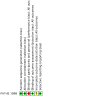
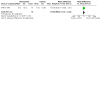
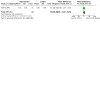
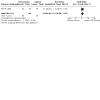
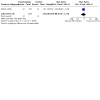
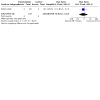
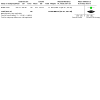
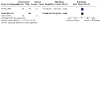
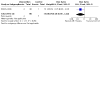
Update of
References
References to studies included in this review
PATHS 1998 {published and unpublished data}
References to studies excluded from this review
Avram 2009 {published data only}
-
- Avram O, Grecu I, Macovei R, Marinescu O, Grintescu I. Benefits of implementation of a protocol for identification of preoperative chronic alcohol abusers and for alcohol withdrawal syndrome prevention [Beneficiile implementării unui protocol pentru identificarea preoperatorie a pacienţilor cu alcoolism cronic şi profilaxia sindromului de sevraj etilic perioperator]. Jurnalul Român de Anestezie Terapie Intensiva 2009;16(2):121-7.
Baros 2008 {published data only}
BHAIT 2015 {published data only}85355606
-
- Grimm C. Bradford hypertension and alcohol intervention trial: a randomised cluster trial. www.isrctn.com/ISRCTN85355606?q=Grimm&filters=&sort=&offset=... (date first received 1 July 2015). [DOI: 10.1186/ISRCTN85355606] - DOI
Bjorkqvist 1975 {published data only}
-
- Bjorkqvist SE. Clonidine in alcohol withdrawal. Acta Psychiatrica Scandinavica 1975;52(4):256-63. - PubMed
Bulpitt 1999 {published data only}
Burke 2006 {published data only}
-
- Burke V, Beilin LJ, Cutt HE, Mansour J, Williams A, Mori TA. A lifestyle program for treated hypertensives improved health-related behaviors and cardiovascular risk factors, a randomized controlled trial. Journal of Clinical Epidemiology 2007;60:133-41. [DOI: 10.1016/j.jclinepi.2006.05.012] - DOI - PubMed
Chang 2011 {published data only}
Cicolini 2014 {published data only}
-
- Cicolini G, Simonetti V, Comparcini D, Celiberti I, Di Nicola M, Capasso LM, et al. Efficacy of a nurse-led email reminder program for cardiovascular prevention risk reduction in hypertensive patients: a randomized controlled trial. International Journal of Nursing Studies 2014;51(6):833-43. [DOI: 10.1016/j.ijnurstu.2013.10.010] - DOI - PubMed
COMBINE 2006 {published data only (unpublished sought but not used)}
-
- Stewart SH, Latham PK, Miller PM, Randall P, Anton RF. Blood pressure reduction during treatment for alcohol dependence: results from the COmbining Medications and Behavioral INtErventions for alcoholism (COMBINE) study. Addiction 2008;103(10):1622-8. [DOI: 10.1111/j.1360-0443.2008.02317.x] - DOI - PMC - PubMed
Coulton 2008 {published data only}
-
- Coulton S, Watson J, Bland M, Drummond C, Kaner E, Godfrey C, et al. The effectiveness and cost-effectiveness of opportunistic screening and stepped care interventions for older hazardous alcohol users in primary care (AESOPS) - a randomised control trial protocol. BMC Health Services Research 2008;8:129. [DOI: 10.1186/1472-6963-8-129] - DOI - PMC - PubMed
De Bejczy 2014 {published data only}
-
- De Bejczy A, Nations KR, Szegedi A, Schoemaker J, Ruwe F, Söderpalm B. Efficacy and safety of the glycine transporter-1 inhibitor Org 25935 for the prevention of relapse in alcohol-dependent patients: a randomized, double-blind, placebo-controlled trial. Alcoholism, Clinical & Experimental Research 2014;38(9):2427-35. [DOI: 10.1111/acer.12501 ] - PubMed
Dennison 2007 {published data only}
-
- Dennison CR, Post WS, Kim MT, Bone LR, Cohen D, Blumenthal RS, et al. Underserved urban African American men: hypertension trial outcomes and mortality during 5 years. American Journal of Hypertension 2007;20(2):164-71. [DOI: 10.1016/j.amjhyper.2006.08.003 ] - PubMed
ETOH‐AF 2016 {published data only}
Fleming 1999 {published data only}
-
- Fleming MF, Manwell LB, Barry KL, Adams W, Stauffacher EA. Brief physician advice for alcohol problems in older adults: a randomized community-based trial. Journal of Family Practice 1999;48(5):378-84. [PMID: ] - PubMed
Fleming 2004 {published data only}
Heirich 2000 {published and unpublished data}
Lang 1995 {published data only}
Rose 2008 {published data only}
Soyka 2008 {published and unpublished data}
-
- Soyka M, Koller G, Schmidt P, Lesch OM, Leweke M, Fehr C, et al. Cannabinoid receptor 1 blocker rimonabant (SR 141716) for treatment of alcohol dependence. Results from a placebo-controlled, double-blind trial. Journal of Clinical Psychopharmacology 2008;28(3):317-24. [DOI: 10.1097/JCP.0b013e318172b8bc] - DOI - PubMed
Ueshima 1989 {published and unpublished data}
-
- Ueshima H. Non-drug treatment of mild hypertension and its limits: hypotensive effect of cutting down on drinking and its limits. Therapeutic Research 1989;10(7):2614-9.
Ueshima 1993 {published data only}
-
- Ueshima H, Mikawa K, Baba S, Sasaki S, Ozawa H, Tsushima M, et al. Effect of reduced alcohol consumption on blood pressure in untreated hypertensive men. Hypertension 1993;21(2):248-52. [10.1161/01.hyp.21.2.248 ] - PubMed
Volicer 1982 {published data only}
-
- Volicer BJ, Volicer L. Randomized response technique for estimating alcohol use and noncompliance in hypertensives. Journal of Studies on Alcohol 1982;43(7):739-50. [DOI: 10.15288/jsa.1982.43.739 ] - PubMed
Wallace 1988 {published data only (unpublished sought but not used)}
Wilson 2014 {published data only}
-
- Wilson GB, Wray C, McGovern R, Newbury-Birch D, McColl E, Crosland A, et al. Intervention to reduce excessive alcohol consumption and improve comorbidity outcomes in hypertensive or depressed primary care patients: two parallel cluster randomized feasibility trials. Trials 2014;15(235):1-15. [DOI: 10.1186/1745-6215-15-235] - DOI - PMC - PubMed
References to studies awaiting assessment
OSAKE 2015 {unpublished data only}UMIN000017454
-
- A randomized controlled trial of saving alcohol amount program for keeping optimal blood pressure control in patients with hypertension. The University Hospital Medical Information Network Center (UMIN);Osaka University Graduate School of Medicine Division of Health Sciences:Available at: https://rctportal.niph.go.jp/en/detail?trial_id=UMIN000017454. [UMIN ID: UMIN000017454]
Additional references
Amato 2010
Briasoulis 2012
Burton 2016
Cushman 2001
Fernández‐Solà 2015
Ferri 2006
Foxcroft 2015
Foxcroft 2016
GBD 2016
-
- GBD 2016 Risk Factors Collaborators. Global, regional, and national comparative risk assessment of 84 behavioural, environmental and occupational, and metabolic risks or clusters of risks, 1990-2016: a systematic analysis for the Global Burden of Disease Study 2016. Lancet 2017;390(10100):1345-422. [DOI: 10.1016/S0140-6736(17)32366-8] - DOI - PMC - PubMed
Gepner 2015
-
- Gepner Y, Golan R, Harman-Boehm I, Henkin Y, Schwarzfuchs D, Shelef I, et al. Effects of initiating moderate alcohol intake on cardiometabolic risk in adults with type 2 diabetes: a 2-year randomized, controlled trial. Annals of Internal Medicine 2015;163(8):569-79. [DOI: 10.7326/M14-1650 ] - PubMed
Gepner 2016
-
- Gepner Y, Henkin Y, Schwarzfuchs D, Golan R, Durst R, Shelef I, et al. Differential effect of initiating moderate red wine consumption on 24-h blood pressure by alcohol dehydrogenase genotypes: randomized trial in type 2 diabetes. American Journal of Hypertension 2016;29(4):476-83. [DOI: 10.1093/ajh/hpv126] - DOI - PMC - PubMed
Gilligan 2016
GRADEpro [Computer program]
-
- McMaster University (developed by Evidence Prime Inc.) GRADEpro GDT: GRADEpro Guideline Development Tool. McMaster University (developed by Evidence Prime Inc.), 2015. Available from gradepro.org.
Higgins 2011
-
- Higgins JPT, Altman DG, Sterne JAC. Assessing risk of bias in included studies. In: Higgins JP, Green S, editor(s). Cochrane Handbook for Systematic Reviews of Interventions Version 5.1.0 [updated March 2011]. The Cochrane Collaboration, 2011. Available from handbook.cochrane.org.
Hypertension Canada 2018
-
- Nerenberg KA, Zarnke KB, Leung AA, Dasgupta K, Butalia S, McBrien K, et al. Hypertension Canada's 2018 Guidelines for Diagnosis, Risk Assessment, Prevention, and Treatment of Hypertension in Adults and Children. Canadian Journal of Cardiology 2018;34(5):506-25. [DOI: 10.1016/j.cjca.2018.02.022] - DOI - PubMed
ICH 1995
-
- European Medicines Agency. Clinical safety data management: definitions and standards for expedited reporting. www.ema.europa.eu/en/ich-e2a-clinical-safety-data-management-definitions... (accessed prior to 16 September 2020).
Ipser 2015
Ismail 2010
-
- Ismail K, Maissi E, Thomas S, Chalder T, Schmidt U, Bartlett J, et al. A randomised controlled trial of cognitive behaviour therapy and motivational interviewing for people with Type 1 diabetes mellitus with persistent sub-optimal glycaemic control: A Diabetes and Psychological Therapies (ADaPT) study. Health Technology Assessment 2010;14(22):1-101, iii-iv. - PubMed
Kaner 2018
Kazeem 2015
-
- Kazeem A, Car J, Pappas Y. Telephone consultations for the management of alcohol-related disorders. Cochrane Database of Systematic Reviews 2015, Issue 11. Art. No: CD009267. [DOI: 10.1002/14651858.CD009267.pub2] - DOI
Klatsky 2015
Kranzler 2018
Larsson 2016
Lui 2008
McQueen 2009
Mills 2016
Minozzi 2010
Moyers 2009
NICE 2016
-
- National Clinical Guideline Centre. Hypertension in adults: diagnosis and management (CG127) (updated 2016). www.nice.org.uk/guidance/CG127 (accessed prior to 16 September 2020).
Pani 2010a
Pani 2010b
-
- Pani PP, Trogu E, Amato L, Davoli M. Antidepressants for the treatment of depression in alcohol dependent individuals. Cochrane Database of Systematic Reviews 2010, Issue 7. Art. No: CD008581. [DOI: 10.1002/14651858.CD008581] - DOI
Puddey 2006
Rehm 2017
RevMan 2014 [Computer program]
-
- Nordic Cochrane Centre, The Cochrane Collaboration Review Manager 5 (RevMan 5). Version 5.3. Copenhagen: Nordic Cochrane Centre, The Cochrane Collaboration, 2014.
Ricci 2018
Roerecke 2017
Rösner 2010
Schünemann 2013
-
- Schünemann H, Brożek J, Guyatt G, Oxman A (editors). Introduction to GRADE Handbook. In: Handbook for grading the quality of evidence and the strength of recommendations using the GRADE approach (updated October 2013). GRADE Working Group, 2013. Available from gdt.guidelinedevelopment.org/app/handbook/handbook.html.
Sesso 2008
Smith 2009
Stade 2009
-
- Stade BC, Bailey C, Dzendoletas D, Sgro M, Dowswell T, Bennett D. Psychological and/or educational interventions for reducing alcohol consumption in pregnant women and women planning pregnancy. Cochrane Database of Systematic Reviews 2009, Issue 2. Art. No: CD004228. [DOI: 10.1002/14651858.CD004228.pub2] - DOI - PMC - PubMed
Tasnim 2020
Taylor 2009
Vaz de Lima 2010
-
- Vaz de Lima FB, Andriolo RB, Da Silveira DX. Dopaminergic antagonists for alcohol dependence. Cochrane Database of Systematic Reviews 2010, Issue 4. Art. No: CD008460. [DOI: 10.1002/14651858.CD008460] - DOI

